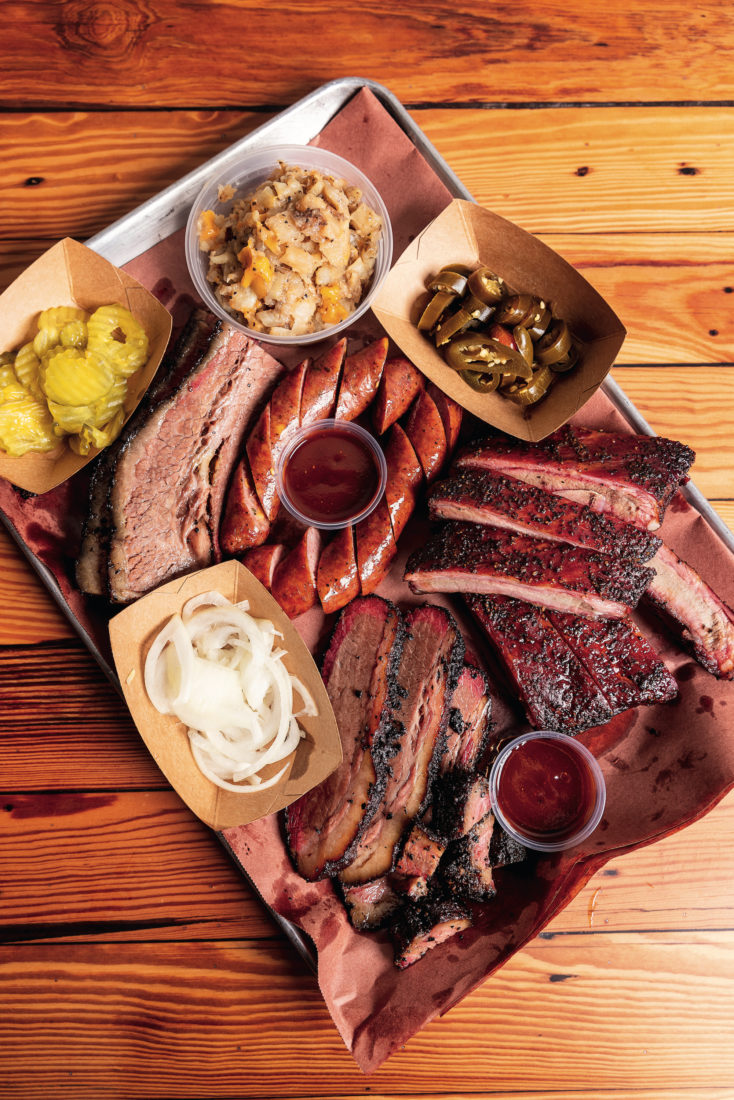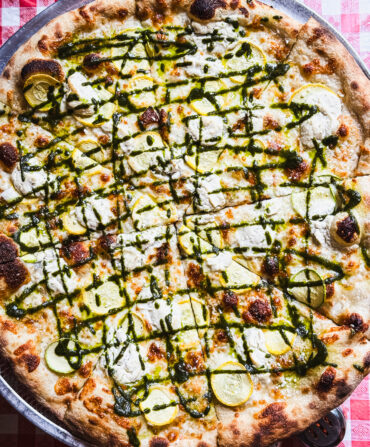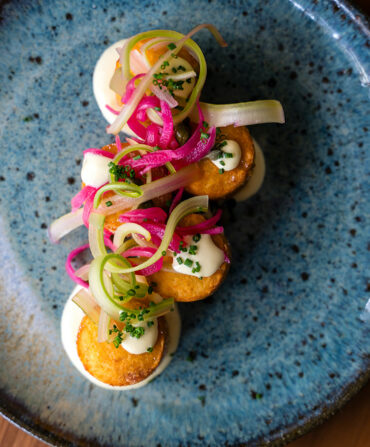From the street, the flat roof on the corner building looks like a black iron lid floated over a gray brick pit. Smoke plumes upward, dissolving into the cobalt-blue Texas Hill Country sky. Viewed through roll-up doors, church groups drink coffee and thumb Bibles tagged with sticky notes. High school soccer coaches eat house-made sausages wrapped in comal-blistered tortillas.
Instead of pulling up at a drive-through window, commuters line the curb at Miller’s Smokehouse in Belton, a courthouse-square town sixty miles north of Austin on I-35. Carhops with walkie-talkies clipped to their vests take orders with iPads. Katy Miller, a physical education teacher at Leon Heights Elementary, idles in a white SUV, her three boys seat-belted in the rear, waiting on her regular twofer of a drip and a latte.
Her husband, Dusty Miller, who began serving barbecue on the side at his father’s deer-processing and taxidermy business in 2008, sits at a corner table. Wearing a green camo snap-back, he talks about the evolution from skinning hides and stuffing taxidermy to smoking jalapeño-cheese pork links and pulling creamy espressos for cortados.
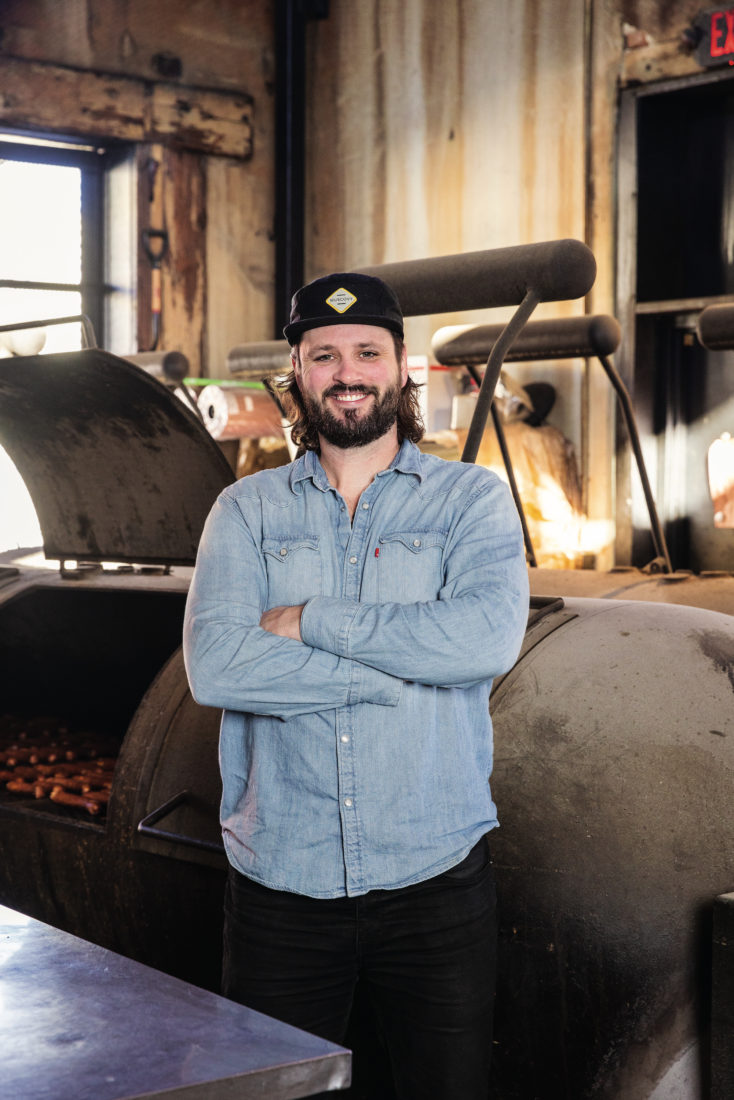
The path to this location, which opened in late 2016, has been serpentine. Dusty earned a master’s in accounting from Baylor. He worked a corporate job in Austin. He grew his hair out. He married and made a home out of an Airstream. Katy and he bought and sold real estate. Dusty worked as a car parker, saving money to take his chance. When they started serving barbecue, he and his father cooked in an alley between two buildings. And their customers ate in bright yellow booths salvaged from a Subway.
“There were still secrets in barbecue back then,” Dusty says of his beginnings, and of the early years of the twenty-first century, when the ongoing barbecue renaissance began. “Since then, books have been written. YouTube channels have been created. Hundreds of new people are now in the game, doing really good work. What we were doing then couldn’t hold up to what we’re doing now.”
Dusty is a traditionalist. The crew at Miller’s cooks on smokers made from retrofitted thousand-gallon propane tanks, fed by offset smoke boxes. And they stoke those leviathans with post oak if they can, pecan if they need to. He’s also a modernist. Eight years back, Miller’s switched to prime beef. That brisket is more expensive, he says, but it’s threaded with fat, which gives it a better chance to emerge juicy from the pits.
“Everything is evolving,” he says, smiling through his beard, eyes glinting with excitement for the work. In 2020 they added breakfast. Home from a trip to Charleston, South Carolina, Dusty developed a breakfast pimento cheese grits bowl in which sun-dried tomatoes, crumbled sausage, and blackened okra orbit an over-easy sun. Eating a sausage between sips of an espresso, Dusty noticed that smoked meat enhanced the chocolate flavors in the coffee. It worked the other way, too. That’s how Miller’s came to rub briskets with a roast from Brazil, the same grind the restaurant uses for cold brew coffees. The beans impart flavor; they also help form the all-important brisket bark.
For the past several years, Miller’s has landed a spot on the Texas Monthly top-fifty list, spearheaded by the writer Daniel Vaughn. That attention draws luxury sedans and pickups to the parking lot. It also demands constant improvement. After Vaughn made fun of the grocery store tortillas Miller’s once used for sausage wraps, Dusty and his team developed a recipe for Sonoran-style flour tortillas made with the tallow from briskets. (Tallow is also the secret to their crazy-delicious butter potatoes and squeaky green beans.)
Those tortillas make ideal wraps for their smoked meats, including a Memphis-worthy pulled pork with coleslaw. The best sandwiches are the baroque ones, like Tha’ Curtis, named for a regular who liked to order a mix of chopped brisket, pinto beans, and Fritos, layered with onion and jalapeño slices, tucked inside a bun.
Miller’s remains a family restaurant. Dusty’s father, Dirk, walks the floor and works the pancake station. His mother, Lisa, makes biscuits and cinnamon rolls and bakes pecan pies that are models of restraint and delicate crust work. But the energy revolves around Dusty, who runs the place like it’s a laboratory for progressive business practices.
He asks big questions: “Can you use a business to grow the number of people who trust one another?” He theorizes: “If you’re not happy in your life, work will become the object of your negativity.” He social engineers: “The only way to grow a service-oriented business is for the people who work with you to like each other, maybe even love each other.” It all sounds hopelessly idealistic until you recognize the ongoing yield of the people investments he has made.
Amadeo Chapa began chopping potatoes at Miller’s when he was in college. Now he runs the restaurant’s social media, roasts beans, and grows the coffee side of the business. To that end, Dusty has hired coaches to mentor Chapa as they imagine a future when a barbecue joint in Belton will be a third-wave coffee bellwether.
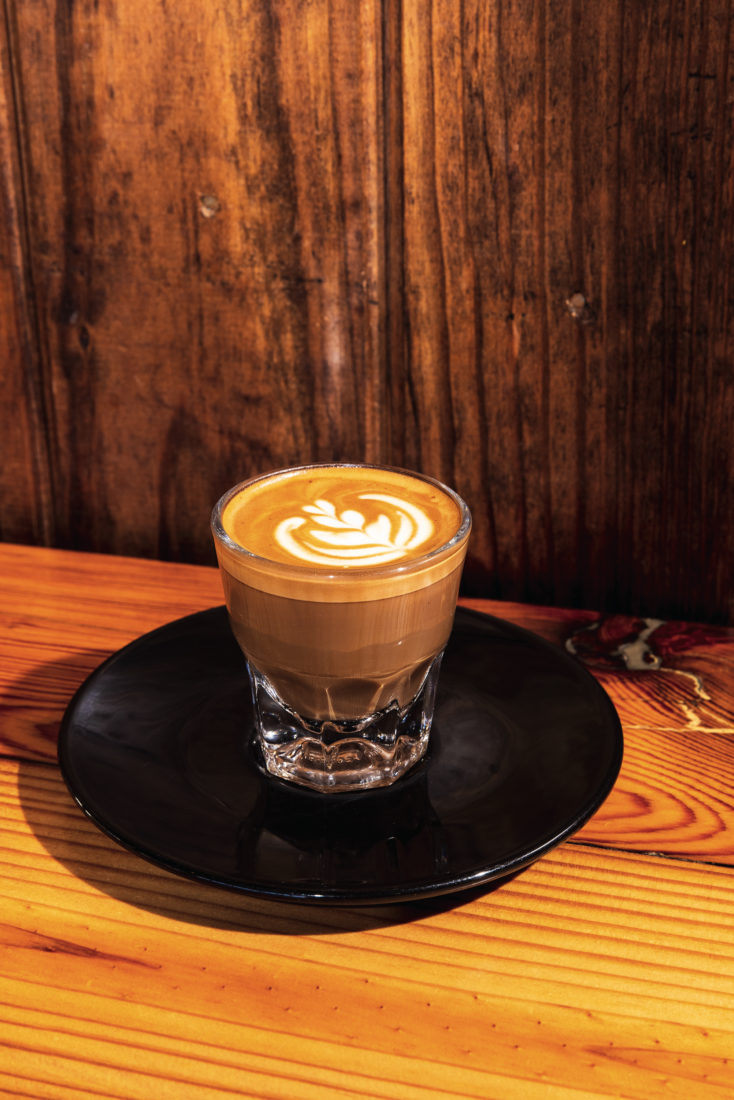
Proof of that good decision arrives in the form of a frothy cortado, served in a faceted glass on a black saucer. Chapa says that perfume makers, sampling their way through possible scents, clear their noses with a sniff of coffee beans. “Maybe that’s what happens when you drink a cortado after eating barbecue,” he says. “Coffee cleanses and gets you ready for the next scent.” Just as Miller’s gets you ready for the next big leap in barbecue.


